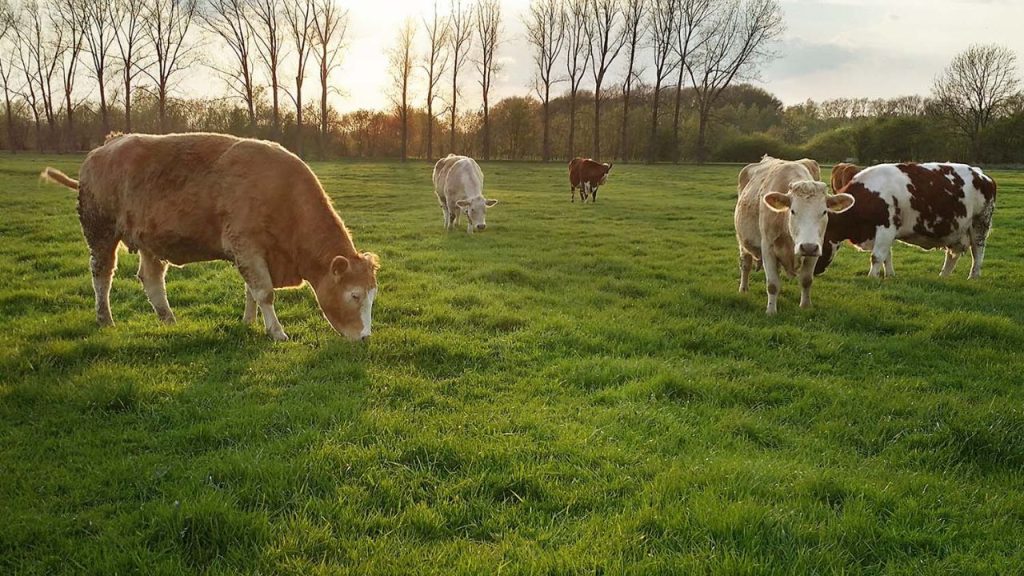Sustainability and Environmental Impact
Sustainability is becoming increasingly central to the future of livestock farming. The environmental impact of livestock production, particularly in terms of greenhouse gas emissions, is under growing scrutiny. Livestock farming accounts for a significant portion of the UK’s agricultural emissions, primarily in the form of methane from ruminants such as cattle and sheep. To address this, the sector is adopting a range of strategies:
1. Reducing Emissions
Reducing emissions is a priority for the future of livestock farming. Farmers are exploring ways to lower the carbon footprint of their operations through better management practices, dietary adjustments for livestock, and the use of methane inhibitors. Additionally, the adoption of regenerative agricultural practices, such as rotational grazing and agroforestry, can enhance carbon sequestration and improve soil health, further mitigating the sector’s environmental impact.
2. Precision Farming and Technology
The integration of precision farming technologies is revolutionising livestock farming. Tools such as GPS tracking, sensors, and data analytics allow farmers to monitor the health, nutrition, and productivity of their animals more closely. These technologies enable more efficient use of resources, such as feed and water, and help reduce waste and environmental impact. Precision farming also enhances animal welfare by allowing for more personalised care and early detection of health issues.
Animal Welfare and Ethical Considerations
Animal welfare is another key focus for the future of livestock farming. Consumers are increasingly concerned about the ethical treatment of animals, and there is growing demand for higher welfare standards in the industry. Farmers are responding by implementing practices that prioritise animal health and well-being:
1. Free-Range and Pasture-Based Systems
There is a growing trend towards free-range and pasture-based livestock systems, which offer animals more space, natural diets, and better living conditions. These systems are often perceived as more ethical and are becoming increasingly popular among consumers who are willing to pay a premium for products from higher welfare systems. However, these systems also require more land and resources, which can present challenges for scalability.
2. Certification and Labelling
Certification schemes and labelling are playing a crucial role in promoting animal welfare. Labels such as “RSPCA Assured” or “Organic” provide consumers with information about the welfare standards under which livestock were raised. These schemes encourage farmers to adopt higher welfare practices and help build consumer trust in British livestock products.
Economic Viability and Market Access
The economic viability of livestock farming is under pressure from various factors, including fluctuating market prices, rising input costs, and changing trade dynamics post-Brexit. To ensure long-term sustainability, the sector must adapt to these challenges:
1. Diversification and Value-Added Products
Diversification is becoming increasingly important for the economic viability of livestock farms. Farmers are exploring opportunities to add value to their products, such as producing speciality meats, dairy products, or organic goods. Direct-to-consumer sales through farm shops, farmers’ markets, and online platforms are also helping farmers capture a larger share of the market and build stronger connections with consumers.
2. Access to Global Markets
Post-Brexit trade agreements are reshaping market access for British livestock products. While there are opportunities to expand into new markets, such as Asia and the Middle East, there are also challenges, including meeting differing standards and tariffs. The UK government and industry bodies are working to support farmers in navigating these new trade landscapes and ensuring that British livestock products remain competitive on the global stage.
Innovation and Technological Advancements

Innovation and technology will be critical to the future of livestock farming. The sector is seeing rapid advancements in areas such as genetics, animal health, and sustainable farming practices:
1. Genetic Improvements
Advances in genetics are enabling the breeding of livestock that are more efficient, resilient, and better suited to changing environmental conditions. Genetic improvements can lead to animals that require less feed, produce less methane, and are more resistant to diseases. These innovations help to enhance productivity while reducing the environmental impact of livestock farming.
2. Sustainable Feed Alternatives
The development of sustainable feed alternatives is another area of innovation. Researchers are exploring the use of alternative protein sources, such as insect meal and algae, which have a lower environmental footprint compared to traditional feedstocks like soy. These alternatives could help reduce the environmental impact of livestock farming and make the sector more sustainable in the long term.
The Role of Policy and Support
Government policy and support will play a crucial role in shaping the future of livestock farming in the UK. Post-Brexit agricultural policy is shifting towards rewarding environmental stewardship and sustainability, with the introduction of schemes such as the Environmental Land Management (ELM) scheme:
1. Environmental Land Management (ELM) Scheme
The ELM scheme is designed to incentivise farmers to adopt practices that benefit the environment, such as reducing emissions, enhancing biodiversity, and improving soil health. This scheme will be a key driver in promoting sustainable livestock farming practices across the UK.
2. Support for Innovation and Transition
Government support for innovation and the transition to more sustainable farming practices will be essential. This includes funding for research and development, grants for adopting new technologies, and training programmes to help farmers build the skills needed for the future.
Conclusion: Innovations in Crop Rotation for British Farmers
The future of livestock farming in the UK is set to be shaped by a complex mix of challenges and opportunities. Sustainability, animal welfare, economic viability, and technological innovation will all play crucial roles in determining the direction of the sector. By embracing change and adopting new practices, British livestock farmers can ensure that they remain competitive and resilient in the face of a rapidly evolving agricultural landscape. As the industry continues to adapt, it will be essential to strike a balance between meeting the demands of consumers, protecting the environment, and ensuring the long-term viability of farming communities across the UK.
